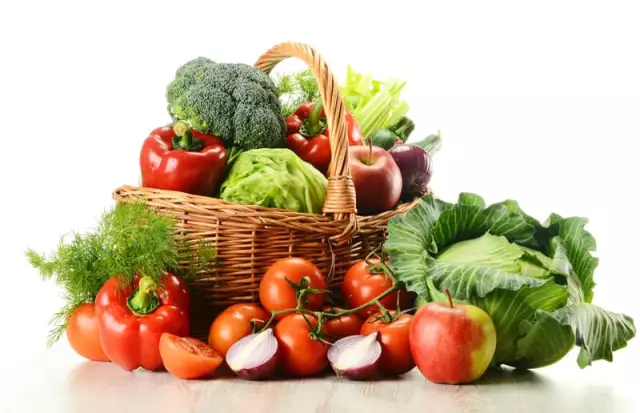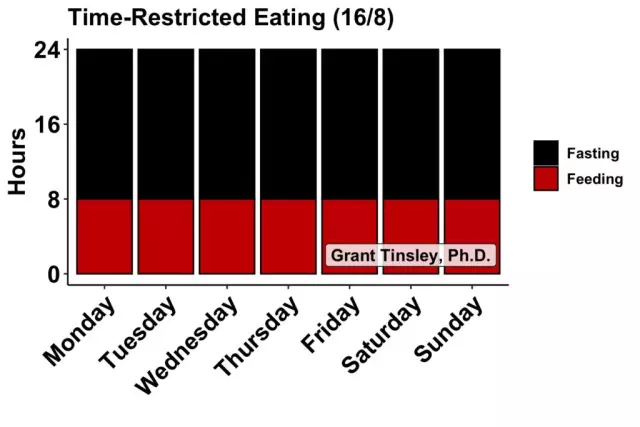- Author Rachel Wainwright [email protected].
- Public 2023-12-15 07:39.
- Last modified 2025-11-02 20:14.
Vegetarianism for children: health benefit or harm?
Quite a few people adhere to the principles of a vegetarian diet. But what if the vegetarian family has children? Can they eat like their parents, or is the child's body not adapted to eating exclusively plant foods? Let's try to figure it out.

Source: depositphotos.com
First you need to understand what kind of vegetarianism we are talking about. The strictest in this regard can be called a raw vegan diet, which implies a complete rejection of not only food of animal origin, but also from heat treatment of products.
Vegans do not consume meat, fish, milk and eggs at all, they only occasionally allow themselves honey. Ovo-vegetarian people can eat both honey and eggs, but not milk, meat and fish. Lacto-vegetarians eat honey and milk, but refuse meat and eggs. Finally, lacto-ovo vegetarianism is the most gentle in this respect, since it excludes meat, fish and seafood from the diet, but allows milk, eggs and honey.
Benefits of a vegetarian eating style
It is impossible to disagree with vegetarians that there is not so much benefit to humans from industrially grown meat. Livestock accounts for about half of all antibiotics released in the world. They are used preventively - to prevent diseases. In addition, growth stimulants, including hormonal drugs, are actively used in animal husbandry. This has not been a secret for anyone for a long time.
Of course, not everyone is able to grow animals and poultry on their own, or at least buy them from proven farms. As for fish, its environmental friendliness is questionable - even oceanic and marine fish can accumulate toxins and other harmful substances.
Vegetarians believe that people eat ten times more protein than they actually need. Vegetables and fruits contain a huge amount of vitamins, trace elements and fiber, which fully covers human needs.
Interestingly, vegetarian children are almost never obese, while this problem is becoming increasingly important for their peers who eat regular food.
Natural and healthy foods improve baby's digestion and strengthen his immune system. It is believed that children who are vegetarians are less likely to get colds and cases of food allergies are extremely rare. All these advantages of a vegetarian diet, of course, deserve a fairly close study.
Very often, young children simply do not want to eat meat - sooner or later most parents face such a problem. The kid refuses to eat chicken, meatballs or cutlets, but is always ready to eat porridge, yogurt and fruit. Doesn't this mean that all children are originally vegetarians, and their parents only instill in them their eating habits?
It can be tempting to go along with your little one by providing a healthy vegetarian diet and forget about colic, indigestion and allergies. But doctors say: everything is not as simple as it seems.
Vegetarianism is a deficiency of protein, iron and vitamins
And here it is difficult to argue with science. It is proteins that are the "building blocks" for the construction of the child's body. Adherents of vegetarianism are trying to compensate for the deficiency of animal protein with vegetable, in particular, legumes, but this is quite difficult. A growing body needs a lot of protein, for example, a baby aged from one to three years old needs to get 4-4.5 g of protein per 1 kg of body weight daily from food.
It is animal proteins that have the highest digestibility - up to 90%. Thus, if a specific type of vegetarianism prohibits the use of not only meat, but also dairy products, eggs, this is fraught with very negative consequences for the child. His parents completely deprive him of his source of animal protein.
The second problem that can be encountered on the way to a healthy lifestyle for a child is iron deficiency, the main source of which is not berries and fruits at all, but all the same meat. Quite often, vegetarian children have insufficient hemoglobin levels.
The third problem is vitamin B12 deficiency, which is indispensable for the normal functioning of the nervous and circulatory systems of the child's body. B12 is practically absent in plant products.
Finally, it will take a lot of plant foods to compensate for calcium and zinc deficiencies - there are far more of them in meat, fish and dairy products than in fruits and vegetables.

Source: depositphotos.com
Which path to take?
Parents should remember that they, in fact, do not give their children a choice - the kids are forced to eat exactly the food that mom and dad gave them. In addition, it must be borne in mind that a vegetarian diet is not offered in kindergarten or school, which means that certain nutritional problems will arise.
All these questions can of course be resolved. But if parents are firmly convinced that the harm from meat and fish is much more than good, you need to approach the preparation of the children's diet carefully, having studied all the recommendations of specialists. Meals should be varied, include various dishes - soups, cereals and casseroles. And doctors strongly advise against removing dairy, fermented milk products and eggs from the child's diet - in the absence of meat and fish in the menu, they become the only available source of animal protein for a growing body.
When the child grows up, he will be able to independently choose the style of food, having understood the philosophy of vegetarianism and comprehended it. In other cases, vegetarianism for children is always the choice of parents, and therefore their responsibility.
YouTube video related to the article:

Maria Kulkes Medical journalist About the author
Education: First Moscow State Medical University named after I. M. Sechenov, specialty "General Medicine".
Found a mistake in the text? Select it and press Ctrl + Enter.






